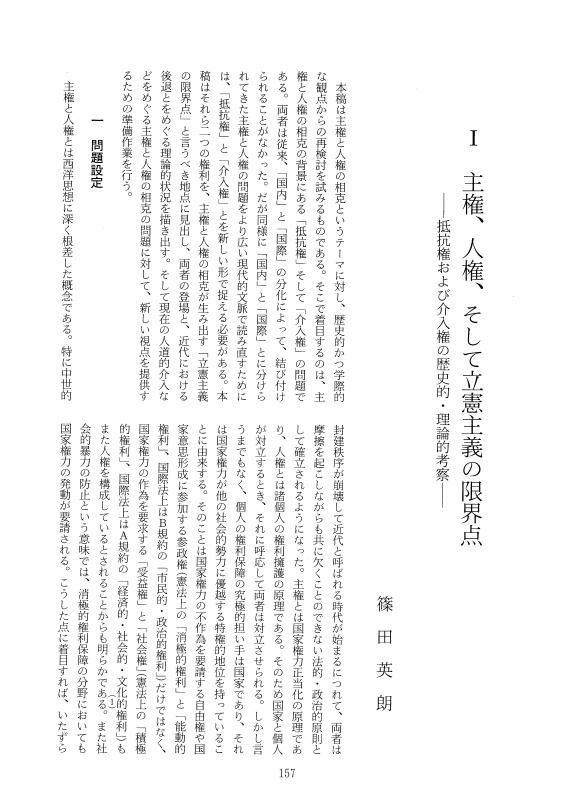- 著者
- 篠田 英朗
- 出版者
- 国際法学会 ; 1912-
- 雑誌
- 国際法外交雑誌 (ISSN:00232866)
- 巻号頁・発行日
- vol.113, no.3, pp.374-396, 2014-11
- 著者
- 篠田 英朗
- 出版者
- 国際安全保障学会
- 雑誌
- 国際安全保障 (ISSN:13467573)
- 巻号頁・発行日
- vol.44, no.4, pp.110-114, 2017-03-31 (Released:2022-04-01)
- 著者
- 篠田 英朗
- 出版者
- ワック
- 雑誌
- Will : マンスリーウイル
- 巻号頁・発行日
- no.187, pp.264-270, 2020-07
2 0 0 0 平和構築と国際刑事法廷 : 人道的介入としての国際司法介入
- 著者
- 篠田 英朗
- 出版者
- 広島大学
- 雑誌
- 広島大学総合科学部紀要. II, 社会文化研究 (ISSN:0385146X)
- 巻号頁・発行日
- vol.27, pp.91-111, 2001-12-31
- 著者
- 篠田 英朗
- 出版者
- 広島大学
- 雑誌
- 広島平和科学 (ISSN:03863565)
- 巻号頁・発行日
- vol.23, pp.1-24, 2001
The Advisory Opinion of the International Court of Justice on the legality ofthe use and the threat of nuclear weapons on July 8, 1996, was a historic achievement inthe history of debates on the legality of nuclear weapons. It drew great attention ofacademics, governments, and civil society organizations and is now recognized as animportant milestone for those who are interested in the issue of nuclear weapons.However, this does not mean that the Opinion concluded the debate on the legality ofnuclear weapons. Rather, it stimulated further discussions and created new problems onthe issue of the legality of nuclear weapons. This article is intended to examine theOpinion in order to identify the polemics that concern the very normative framework ofcurrent international society. The main focal point is the jus cogens character ofinternational humanitarian law, which the Court avoided. In so doing, this articleidentifies the confusion in the Opinion and among the Judges about the relationshipbetween jus in bello and jus ad bellum applied to the use and the threat of nuclearweapons. The article also argues that the notorious concept of "an extreme circumstanceof self-defence, in which the very survival of a State would be at stake" was anunfortunate result of sterile understanding of the relationship between law and politics.
本研究は、国際安全保障における協働化/分業化の状況を分析するため、アフリカに展開する国際平和活動の調査・比較を行う。国連と地域機構・準地域機構が協力して行うパートナーシップ国際平和活動は、アフリカでのみ発展している。なぜか。この問いに答えるために、本研究は、国際安全保障の協働化/分業化の仕組みに着目する。国連PKOが遂行できない武力行使を伴う活動をアフリカでは(準)地域機構が担うことができるため、パートナーシップ平和活動はアフリカでのみ進んできた、という仮説を検証する。主要なアフリカの国際平和活動に焦点をあてて、理論・組織・情勢分析を通じて、国際安全保障の協働化・分業化を解明する。
1 0 0 0 OA 「保護する責任」と国際秩序の進展
- 著者
- 篠田 英朗
- 出版者
- 国際安全保障学会
- 雑誌
- 国際安全保障 (ISSN:13467573)
- 巻号頁・発行日
- vol.40, no.2, pp.8-23, 2012-09-30 (Released:2022-04-07)
1 0 0 0 OA YAMASHITA Hikaru, Humanitarian Space and International Politics: The Creation of Safe Areas
- 著者
- 篠田 英朗
- 出版者
- 国際安全保障学会
- 雑誌
- 国際安全保障 (ISSN:13467573)
- 巻号頁・発行日
- vol.34, no.2, pp.113-116, 2006-09-30 (Released:2022-04-20)
1 0 0 0 OA 納家 政嗣 著『国際紛争と予防外交』
- 著者
- 篠田 英朗
- 出版者
- 国際安全保障学会
- 雑誌
- 国際安全保障 (ISSN:13467573)
- 巻号頁・発行日
- vol.31, no.4, pp.105-109, 2004-03-31 (Released:2022-04-24)
1 0 0 0 OA 主権、人権、そして立憲主義の限界点
- 著者
- 篠田 英朗
- 出版者
- JAPANESE POLITICAL SCIENCE ASSOCIATION
- 雑誌
- 年報政治学 (ISSN:05494192)
- 巻号頁・発行日
- vol.52, pp.157-169, 2002-01-30 (Released:2009-12-21)
1 0 0 0 OA 国際立憲主義・安全保障から見たパートナーシップ平和活動の意義
本研究では、パートナーシップ平和活動という国連と地域・準地域組織の間の国際平和活動における協力関係の高まりを意味する最近の現象が内包する性格を探求した。現代世界におけるパートナーシップ平和活動の全体像を整理する作業を行いつつ、この現象が国際平和活動の最近の傾向を反映したものであることを、国際立憲主義や安全保障の観点から、明らかにした。その過程で、パートナーシップ平和活動が、既存の国際秩序から逸脱するものではなく、むしろ国連憲章が標榜する国際安全保障システムの発展の一形態だと考えるべきものであることを示した。研究対象としてはパートナーシップ平和活動の主要な展開地域であるアフリカに焦点をあてた。
- 著者
- 篠田 英朗
- 出版者
- CCCメディアハウス
- 雑誌
- アステイオン = Αστειον
- 巻号頁・発行日
- no.90, pp.110-127, 2019
- 著者
- 篠田 英朗
- 出版者
- 有斐閣
- 雑誌
- 書斎の窓 = The window of author's study
- 巻号頁・発行日
- no.644, pp.38-42, 2016-03
1 0 0 0 IR 国際平和活動における「法の支配」の確立 : ボスニア=ヘルツェゴビナを事例にして
- 著者
- 篠田 英朗
- 出版者
- 広島大学
- 雑誌
- 広島平和科学 (ISSN:03863565)
- 巻号頁・発行日
- vol.26, pp.215-239, 2004
This paper aims to illuminate how the rule of law is understood in international peace-building activities by looking at the case of Bosnia and Herzegovina. The case is selected since the European countries and the United States that are leading peace-building in Bosnia and Herzegovina have a distinct tendency to emphasize the rule of law in the context of peace-building. While there are more various international rganizations that are given peace-building tasks by the Dayton Peace Agreement of 1995, the paper focuses on the Office of High Representative, the Organization of Security and Cooperation in Europe, the UN's and EU's police missions, as they have leading roles in rule-of-law related activities. The paper finds that the rule of law is now recognized more important than before. The paper argues that it is because democracy has lost importance as a peace-building strategy. In Bosnia and Herzegovina where ethnicity-based forces have kept power through the post-conflict elections, democracy does not appear to be an effective tool for peace-building. The rule of law is understood as a strategy to develop the remedies which democracy may fail to create and is expected to pave the way for more solid peace.
- 著者
- 篠田 英朗
- 出版者
- 広島大学平和科学研究センター
- 雑誌
- 広島平和科学 (ISSN:03863565)
- 巻号頁・発行日
- no.27, pp.47-68, 2005
This essay seeks to look at the case of "rule of law approach" of peacebuilding in Bosnia and Herzegovina from the perspective of the Report by the United Nations Secretary-General Kofi Annan concerning the rule of law in conflict and post-conflict societies. The first section of the essay carefully examines the contents of the Annan's Report issued in 2004. The second section provides an overview of "rule of law" related peacebuilding activities in Bosnia. The third section contemplates the implications of peacebuilding activities in Bosnia, given the issues raised by Annan's Report. The essay finds two characteristics in Bosnia that would explain the arguments in Annan's Report. One is a growing demand for domestic reforms in justice sectors. The other is growing recognition of strategic importance of the rule of law in comparison with other principles like democracy.
1 0 0 0 IR 平和構築プロセスとしての日本の近代化と戦後復興--内的平和と外的平和
- 著者
- 篠田 英朗
- 出版者
- 広島大学平和科学研究センター
- 雑誌
- IPSHU研究報告シリ-ズ (ISSN:13425935)
- 巻号頁・発行日
- no.42, pp.494-524, 2009-03
松尾雅嗣教授退職記念論文集 平和学を拓く




